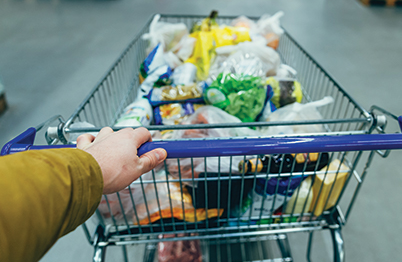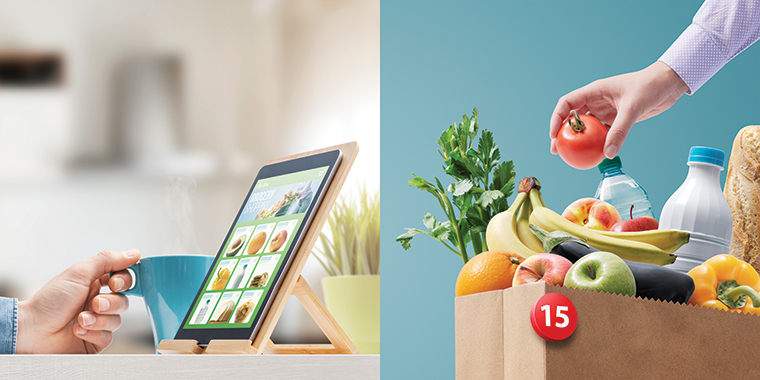Our year-end interviews with independent natural products retailers reveal goals, challenges, surprising innovation, and resilience.
Building on a Solid 2023
Southeast Retailer: “What is most concerning is not being fully staffed. We’re hiring bits and pieces of people because we don’t have enough applicants who want full-time work. Students are good, but they only want limited hours. We’re managing it, but it is way more stressful than a regular hiring cycle. I’m hoping for a breakthrough in that.
“We’ve had a really good 2023 and hope to build on that. We benefited from social media influencers pushing items they found in our store. We also seem to have a more diverse group of people interested in natural products. Young people in their 20s and 30s are buying organic produce, in bigger volumes, more snack foods, and more food overall than before. That hasn’t always been the case, so that’s very exciting. We also have some new young families shopping for their young ones. We hope this is a building trend, because a lot of our long-time customers are getting old.”
Braced for a "Weird" 2024
Northwest Retailer: “I think the election year is probably going to be a little destabilizing. Maybe a long time ago things were different. In 2016, sales were not real strong leading up to that election. And 2020 doesn’t count due to COVID. I think 2024 will be sort of weird. My grocery manager just received a supplier report indicating that there is food cost deflation, or really disinflation, not absolute price declines compared to the pre-inflation price level. I think it’s a debt thing. People are spending less in restaurants and on travel, so are cooking more.
“We are cautiously optimistic. We are planning for the same level of growth as 2023, high single digits, low double digits. We are in a real cultural microclimate here. There are so many people moving to our area. It appears we are doing better than the typical independent natural foods retailer, due to all the people moving into our area.”
Staffing is a Challenge
MidAtlantic Retailer I: “Our goals are unusual. We are not trying to increase business but want to increase our efficiency. We are very efficient. This means everything from ordering paper clips to how we manage the exact processes of business, ringing up customers, doing faster credit card processing, and knowing the online tips of the trade.
“We are looking at why people [employees] are not performing as well as they want to and clarifying their roles. Should we add more to their responsibilities, or take something away? We try to really critique the job to see if we can help.
“We’re doing more social media content, escalating the quality of our online presence. A lot of people make the mistake of hiring young people to do their social media because, being older themselves, they don’t understand it. But that’s like hiring an Uber driver to race the Daytona 500. These kids don’t necessarily know what 'good' is. For example, 80% of our Instagram posts have faces, more than pictures of food, because faces are what people look at and respond to.
“We’re also trying to streamline our hiring process and are making sure we do more due diligence with each candidate. Do they really have a seat on this bus? If so, which seat? If they are not the right fit, we get rid of them very quickly rather than hanging on and letting it deteriorate performance and group morale.”
Nobody Wants to Work
Mountain West Retailer: “In my region of the world, there has been a huge influx of what I will call humanoids. I have to call them that. They are from all over the place. So, we are busy and growing as a result of that. But our valley hurts from the riffraff that makes up some of that influx of newcomers. New people who are quality-focused love the store. We have the products they want and then some. Our people [employees] work hard and love me. I am blessed. We are running the store as we always have, talking to people, doing what we’re supposed to do.
“I don’t like industry stupidity like [names a large vitamin company that has recently gone mass market]. Now they can’t keep up with inventory. They’re greedy. They have hurt themselves and the industry. Their new corporate owners care only about profit margins.
"Another good industry company, NOW Foods, is inspecting their formulas. We are careful to buy direct and from distributors that know what they are selling. There are other industry companies doing a very good job, ethically, and are not stupid.
“I love my people and may have one too many on the payroll, but that’s okay. I will work harder so you can have fun if you want the day off. The workplace is tougher. Nobody wants to work. And the massive federal economic stimulus has triggered inflation, which is demoralizing, and has taken us down. I love my country and fear my government.”
People Are Buying Online
MidAtlantic Retailer II: “Our goals for 2024, well, we are unique: About $2 million of our $5 million in sales is online. So, we have five dedicated people in shipping and receiving. We use Fulfilled-by-Amazon (FBA), and Walmart, Ebay, and our own website. We ship them large amounts of products to resell. Without that we’d be like some of these mom-and-pop stores. We do so well with that. But it is a real crapshoot, and very tedious. Sometimes you get hit. Say Walmart swoops in and orders 48 of one item and wipes you out. It’s a lot of work, phone calls, and customer returns. Unless a store is ready to do something like that, it’s better to not go that route.
“Our in-store customer count is down from previous years. People tell us they’re buying online and come in with their phones to actively compare prices. We’ve always fully passed on company discounts. But to make up for the lack of people coming in, we’re reducing the discounts to just five or 10% off, or even straight retail. We’ve cut food down to one small aisle. The supermarket next door has a better natural food supply than ours. You either have to do food all the way, or just the bare minimum.
“We used to do lectures and hope to restart them, sponsored by some of the vitamin brands we sell, and other in-house lectures. We used to get 60 to 80 people, now we get 15 to 20. We try the education thing. One nutrition employee just quit. We have a retired Doctor of Nutrition and another naturopathic doctor who come in two to three times a month to give free consultations by appointment. The programs they recommend means their customers will spend $2,000 to $3,000. The information is what keeps these customers coming back.
“Based on sales data from our point-of-sale system, we realized we had to raise our margins. They weren’t sustainable with the cost increases we were experiencing. We cut down on newspaper advertising and clipper coupons. No one is reading anymore. We went to a points-reward system with purchases that customers really seem to like.
“I’ve started recording podcasts instead of the radio show that I did for years. No one listens to live radio anymore, but the podcast has a worldwide audience. I do it right from the store. I interview the heads of the vitamin companies we carry.”
Budgets Are Under Pressure
MidAtlantic Retailer III: “My thoughts are there is a tension between the economic condition of our society on the one hand and the increasing desire on the part of people to be more conscious about their health. People are tending to purchase more quality foods and dietary supplements, but their budgets are under pressure, so this sets up a competition between these two forces for the future. Which one of these forces will win? We also don’t know how the global situation will impact us, but it will definitely impact us.
“This means we really do not know what to count on in the future, which makes planning additional investment riskier for a potential downfall. We are not planning any capital investment in 2024. If we were comfortable, we might expand. But we completed an expansion two years ago to 8,300 square feet and have not yet fully taken advantage of it. So for the next two years, we will not do any significant capital expenditures.”
Labor is the #1 Challenge
Southern Retailer: “Labor is always our number one challenge. There’s always attrition. We’ve had a good crew for the last couple of years. When COVID hit, we shut down for a month. It took us a while to recover after reopening, but we had had some toxic people that created enormous stress. Hiring to replace the crew took a while but we have good, nice people now. And good people attract more nice people. With human resources, you almost need to be a psychologist. The consequences when you hire one bad person, it rots your whole team out.
“We’re also trying to stay on top of the inventory. When one thing breaks on our point-of-sale system, two things break. This last update, we failed to make one small computer setting, so our minimum-quantity automatic reorder routine stopped ordering a lot of items, putting us out of stock. We run a skeleton crew, so there’s not as much supervision. Also, when distributors change a product pack-size, the POS system still has the old UPC code, while the product comes in with a different UPC, throwing off the inventory.
“Challenges include prices going up, and customers have limited budgets, so they are spending the same but buying less. The local grocery store changed hands to a lower quality price-point, so there are fewer products people are used to buying locally. Because we are a very small town, I think that created an incentive for locals to make the trip to the larger town 40 minutes away to shop. That hurt us.
“We generally keep growing. We’re still around the $2.5 million level, which we had exceeded before COVID. But $140,000 of that was from our deli, which we closed because it was a nightmare. Deli staff wasn’t following safe food-handling procedures and didn’t care.”
Small Stores Get the Short End of the Stick
Northeast Retailer I: “Well, what can I say? Distributors suck. There’s nowhere left to turn. They discontinue good items and keep bad products. If the large chains don’t buy the product, they discontinue it. And the out-of-stocks are still very high, for the same reason: the chains get the first crack at it, and small stores like ours get the short end of the stick. For our produce orders, you can no longer refuse to take the delivery due to poor quality. You have to wait for the next delivery for a pickup.
“And some of the most important vitamin lines have been bought out and are running high out-of-stocks because of shifts to the mass market and other channels. So, our customers go to other outlets and buy cheaper brands. We’ve redoubled our efforts to identify the highest quality vitamin lines and open accounts with them. We’ll have a lot of new brands on the shelf next year.
“The internet still hurts everybody. Since COVID, the online offers have increased. You can save 30% off plus another 10% if you subscribe to a standing order. Even some of the larger natural specialty chains that have opened stores in our trade area are not doing the sales numbers they should be. They’ve spread the aisles out to 10 feet, so there’s not as much product as in a packed store with 6-foot aisles.
“I can only sell so much CBD. And to open a marijuana dispensary, which is now legal in our state, the government is giving preference to minorities, and to minorities with a criminal record of selling marijuana previously when it was illegal.* So, because I’m not a protected minority and have a clean record, I can’t get a license.
“The year 2020 was our best ever, with sales up 50%. We’ve been slowly dropping since then, as customers learned to buy online, plus we’ve had more local competition. It’s still enough to pay the bills, but we’re not going to get rich anymore. My best-selling item in the store is Iceland Springs water, because I buy 50 cases at a time and retail it at 30% off. It’s 8.8 pH and is the best tasting water.”
 Supplements Continue to be Challenging
Supplements Continue to be Challenging
Northeast Retailer II: “The second half of 2023 has been really good, up 4% after being flat the first half. So, we’ll be up 2% for the year. At $7.2 million, we are maxed out in our 3,000-square-foot store. So, we’re not expecting significant increases for 2024. The last two years were soft or flat, so we’re happy being up 2% this year. I’m encouraged.
“The COVID shakeout together with inflation had a lot to do with the past few years. We’re seeing numbers fall more in line now. Previously, when people were not dining out, we saw higher produce and grocery sales than we had typically experienced. Now we’re reverting to more historical numbers and are comping [comparative year-over-year sales] better in food service, which is 26% of our sales, and a little bit lower in produce because people are eating out more.
“Supplements continue to be a little challenging, as more people go towards internet sales. Our supplement sales have been pretty steady the last few years, slowly declining over the last five years, to about 16% of our total sales. So, we’re not expecting any increases there. And certain vitamin lines are really affected. We just heard today [a major supplement line] that has been out-of-stock forever is going mass market and to different channels.
“So, we are trying to align with companies that want to align with us, to give us our uniqueness. We’re leaning more towards professional, practitioner brands. They are not huge sales but contribute to us having a good department. We want to replace [the major supplement line that just went mass market] wherever we can. We much prefer customers to go to family-run supplement companies.
“Our profit margins have been okay. Our competition is facing the same issues as we are: higher costs, inflation, distribution bottlenecks, and labor. Our state is going to require $16 per hour minimum wage. So, all this has a ripple effect, and retailers realize that. You’ve got to be more strategic in trying to find margin. We got caught last year not reacting quickly enough to price increases, and have been much better this year, staying active to move prices up as soon as costs change.”
We Are Always 1-on-1 With Customers
West Coast Retailer I: “There are so many industry challenges, with companies changing hands, drug companies owning vitamin companies. And there are trash products on television that you have to educate people about. And the way the government mishandled the pandemic was a travesty.
“We do a prerecorded radio show which repeats three times a week on Fridays, Saturdays, and Sundays. We don’t use sponsors and promote our own private label line of vitamins. Listeners get to know our personality as well as our services. Then, we enjoy having a heart-to-heart talk when they make an appointment to come in for nutritional counseling. This is one of our main strengths. We are always one-on-one with customers. We don’t pretend to be doctors, and we tell them so. But we do say, ‘This is what holistic physicians have been recommending for years.’ We address the individual challenges of each person.
“We are primarily a vitamin store and lunch counter, so not a food store. Four years ago, Whole Foods opened three blocks away. We weathered that storm, and have been holding our own, and growing right along. We have the reputation for the best vitamin supply in our area.”
Tech & Innovation Are Helping
West Coast Retailer II: “Our goals are to continue to find unique, exciting products always, to maintain our education of customers, and to provide the service that distinguishes us from our competition. We are also open to innovation and technology. For example, we don’t know how AI [artificial intelligence] will be used. We also don’t know how customers will respond to self-checkout. It might be positive or negative.
“With technology, there are all kinds of applications for individual stores. One tech innovation for food waste has been incredibly successful for us: Too Good to Go. The customer signs up for the app, which then tells them what retailers in their area have food they are giving away at discount prices. Like a surprise bag with a $15 retail value that will sell for $5. The food is dated no later than today’s expiration date. The app company gets $1.35, and the retailer gets $3.65. We’ve made $2,000 in the last three months. We donate expired foods elsewhere. A lot of what we discount is fresh perishables in our own business.
“Our industry is behind in technology. Those things will pop up everywhere. Our city partnered with local retailers to give shoppers back 25% of their purchase value. The customer shops with us, scans their receipt and sends it to the city, which then deposits 25% of the receipt value directly into their bank account. We jumped on the chance to join the program.
“There are so many partnerships. A local school has to provide gluten-free or dairy-free products, and they shop the deals here to do that. There are also all kinds of inventory management tools to get better at data mining, either native in your point-of-sale system, or available from several third-party companies. These expand your buyers’ perspectives by getting them to evaluate whether this product is really what we want; how do we define movement, and how do we promote? We think we don’t have time to use this kind of technology, but because it helps us make better business decisions, it saves time.” WF












